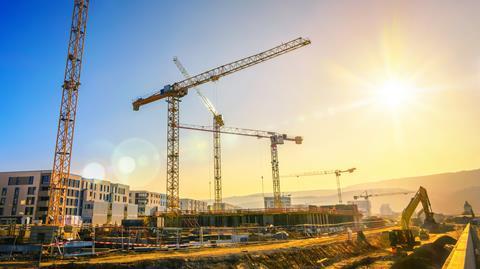Purchasing managers’ survey says residential workloads have dropped for the first time since August
Housebuilding activity fell in December at the steepest rate since the first covid lockdown, according to the latest survey of purchasing managers.
The Chartered Institute of Purchasing and Supply’s construction purchasing managers’ index (PMI) found that housebuilding activity had fallen to an index score of 48, where any score below 50 represents contraction in output, compared to a flatline 50 in November.

The figure is the first time that housebuilding activity has declined since August this year, and represents the steepest decline since May 2020. Despite this, the PMI release, undertaken by S&P Global, still described the fall in housing activity as “marginal”.
The fall contributed to an overall drop in UK construction activity in December, also by the fastest rate since the early months of the covid pandemic amid weakening client demand and ongoing inflationary pressures.
Firms cut jobs for the first time since January 2021 as new orders fell further than at any time over the past two and a half years, according to the PMI figures.
The slump follows three months of growth in the industry which has appeared to defy expectations as forecasts for the wider economy became increasingly gloomy during the autumn.
But flagging confidence among architects seen in RIBA surveys over the last few months, which showed optimism in the sector crashing to the lowest levels since the first covid lockdown, had suggested a downturn further along the construction supply chain may be coming down the tracks.
The seasonally adjusted construction purchasing managers’ index for December was 48.8, down from 50.4 in November, the first contraction in the industry since last August. Again, any number below 50 represents a decline in total industry activity.
Chartered Institute of Procurement and Supply chief economist John Glen said builders were “fast running out of the resilient spirit maintained over the last couple of years as the blocks to success piled up and the winter of discontent with high inflation, strikes and shortages continues.”
Both the decline in construction activity and the drop in new orders was the fastest since May 2020, two months into the first covid lockdown.
Confidence towards the outlook for the year ahead dropped into negative territory for the first time since the beginning of the pandemic, and for only the sixth time on record, with the downbeat mood blamed on expectations of a recession, poor demand and inflation.
December also saw the first fall in employment since January 2021 as weak sales translated to vacancies not being filled, while firms pared back on their spending with the steepest rate of reduction for nearly three years.
S&P Global Market Intelligence economist Lewis Cooper said it had been a “poor finish” to 2022 for the UK industry. “With the outlook turning negative, staffing levels declined for the first time since the start of 2021 in December,” he said.
“Though panellists primarily attributed the fall to the non replacement of leavers, the data show that companies are preparing to face significant challenges in the months ahead.”
As well as a drop in housing activity, civil engineering saw a sixth consecutive monthly drop to 46.8 with the rate of decline remaining sharp.
A brighter spot was commercial activity, which managed to cling on to positive territory at 50.3, although the sector saw the weakest figures in four months.
Despite falls in activity, average lead times lengthened and were at their most severe since June due to product shortages and shipping issues.
Construction costs also continued to increase amid ongoing energy, material, fuel and import hikes, although the rate of inflation was the weakest for two years.
Scape chief executive Mark Robinson said the figures were further evidence of the recession “strengthening its grip on the economy”.
“The construction industry is braced for a tough year and, while there are positive signs that inflation has peaked, increased material costs will undoubtedly continue to shape the plans of developers and local authorities – that latter of which will be confirming their annual budgets this month,” he said.
“Maintaining clear, positive dialogue in 2023 will be crucial if projects are to progress uninhibited, and calm and cautious management will likely pay dividends further down the line when purchasing decisions are ready to accelerate again.”
Average house prices in the UK fell for the fourth month in a row in December, dropping by 1.5% compared to November, according to Halifax.











No comments yet